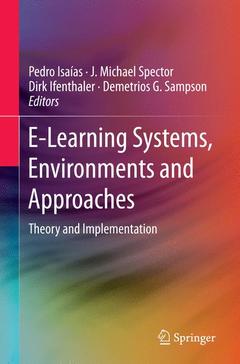E-Learning Systems, Environments and Approaches, Softcover reprint of the original 1st ed. 2015 Theory and Implementation
Coordonnateurs : Isaías Pedro, Spector J. Michael, Ifenthaler Dirk, Sampson Demetrios G.

Presents papers from the 2013 CELDA Conference
Represents the very latest work in the area where internet, technology and instructional design intersect
Includes contributions from professionals in a variety of disciplines, including education, psychology, instructional design and information technology
Includes supplementary material: sn.pub/extras
Date de parution : 10-2016
Ouvrage de 329 p.
15.5x23.5 cm
Disponible chez l'éditeur (délai d'approvisionnement : 15 jours).
Prix indicatif 52,74 €
Ajouter au panierDate de parution : 03-2015
Ouvrage de 329 p.
15.5x23.5 cm
Disponible chez l'éditeur (délai d'approvisionnement : 15 jours).
Prix indicatif 52,74 €
Ajouter au panier


